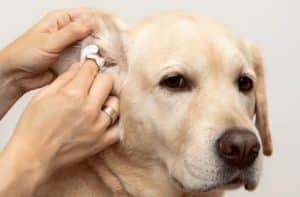
Ear infections are a common problem in dogs, affecting their quality of life and potentially leading to serious complications if left untreated. Understanding the causes, symptoms, and treatment options is essential for any dog owner to ensure their pet’s ear health. In this article, we’ll explore everything you need to know about ear infections in dogs, including prevention tips and guidance on choosing the right veterinarian for your pet.
Causes of Ear Infections in Dogs
Ear infections in dogs are typically caused by the overgrowth of bacteria, yeast, or fungi in the ear canal. Several factors can contribute to this, including:
- Allergies: Food allergies or environmental allergens often cause inflammation, leading to an increased risk of infection.
- Excess Moisture: Water trapped in the ears after swimming or bathing creates an ideal environment for microbial growth.
- Ear Anatomy: Dogs with floppy ears, such as Cocker Spaniels and Basset Hounds, are more prone to infections due to reduced airflow.
- Ear Mites: These tiny parasites can irritate the ear canal and lead to secondary infections.
- Foreign Bodies: Grass seeds, dirt, or other debris can lodge in the ear canal and cause irritation or infection.
- Underlying Health Conditions: Hormonal imbalances or autoimmune diseases can weaken a dog’s immune system, making them more susceptible to infections.
Signs and Symptoms of Ear Infections in Dogs
Ear infections can cause noticeable discomfort in your dog. Common signs and symptoms include:
- Ear Scratching: Persistent scratching or pawing at the ears.
- Head Shaking: Dogs may shake their heads frequently to relieve discomfort.
- Odor: A strong, unpleasant smell coming from the ears.
- Redness and Swelling: Inflamed or irritated ear canals.
- Discharge: Brown, yellow, or black discharge may be visible in the ear canal.
- Pain or Sensitivity: Dogs may yelp or pull away when their ears are touched.
- Behavioral Changes: Irritability or withdrawal due to pain or discomfort.
- Hearing Loss: In severe or chronic cases, ear infections may impact hearing.
Diagnosis of Ear Infections in Dogs
If you suspect your dog has an ear infection, it’s important to consult your veterinarian. Diagnosis typically involves:
- Physical Examination: The veterinarian will inspect your dog’s ears for redness, swelling, and discharge.
- Otoscopy: An instrument called an otoscope is used to view the ear canal and eardrum.
- Cytology: A sample of the discharge may be analyzed under a microscope to identify bacteria, yeast, or other pathogens.
- Allergy Testing: In cases of recurrent infections, allergy testing may help determine underlying causes.
Treatment for Ear Infections in Dogs
Effective treatment depends on the severity and underlying cause of the infection. Common approaches include:
Medications
- Topical Treatments: Ear drops containing antibiotics, antifungals, or anti-inflammatory agents are often prescribed.
- Oral Medications: In more severe cases, systemic antibiotics or antifungals may be necessary.
- Steroids: Anti-inflammatory drugs can reduce swelling and discomfort.
Ear Cleaning
Your veterinarian may recommend cleaning your dog’s ears to remove debris and discharge. Avoid using over-the-counter ear cleaners without professional advice, as some products may worsen the infection.
Addressing Underlying Causes
If allergies or other conditions are contributing to the infection, addressing these issues is crucial to prevent recurrence. This may involve dietary changes, allergy medications, or immune-supportive treatments.
Prognosis and Recovery
With prompt and appropriate treatment, most ear infections resolve within a few weeks. However, chronic or untreated infections can lead to complications such as:
- Permanent ear canal narrowing (stenosis)
- Hearing loss
- Painful abscesses or ruptured eardrums
Regular follow-up visits with your veterinarian ensure the infection is fully resolved and helps prevent future issues.
Living with a Dog Prone to Ear Infections
For dogs with recurring ear infections, prevention and ongoing care are key. Tips include:
- Regular Cleaning: Clean your dog’s ears as recommended by your vet to remove wax and debris.
- Dry Ears After Swimming: Thoroughly dry your dog’s ears after swimming or bathing.
- Monitor for Allergies: Manage food or environmental allergies that may trigger ear problems.
- Routine Vet Visits: Schedule regular check-ups to catch early signs of ear infections.
Choosing a Veterinarian for Your Dog’s Ear Health
Finding the right veterinarian is essential for managing ear infections effectively. Look for a vet who:
- Has experience with treating ear infections and related conditions.
- Offers advanced diagnostic tools such as cytology and otoscopy.
- Provides clear instructions for home care and prevention.
- Communicates openly about treatment options and prognosis.
Conclusion
Ear infections in dogs can be a painful and frustrating issue, but with the right care and preventive measures, most dogs recover fully. By recognizing the symptoms early and seeking professional treatment, you can protect your furry friend’s ear health and overall well-being.
Thank you for your interest in our ear infections dog health article. Be sure to check out the many comprehensive articles on our Dog Health Problems home page.
